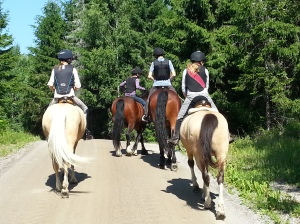We were out walking today and talked about what was the best thing about 2013. For my part it was easy to answer – finishing and defending my PhD! Yes on November 26 I finally defended my PhD, proof here. But 2013 has been a particular eventful year for me. Most of which I have touched upon in my previous post so I won’t dwell anymore on that, suffice to say that I really wish I had had some more time for blogging (no new posts and 500+ unread posts in my feedly…) and twittering these past months. When I met with Michelle (@InterpDiaries), in April I think it was, we both agreed that it isn’t ideas that lack when it comes to blogging, if only there were some more hours in a day.
During autumn I’ve been busy teaching two introductory courses on interpreting, one in Bergen (TOLKHF) and one in Stockholm (ToÖ I). At TÖI (the Institute for Interpreting and Translation Studies), I’ve also been busy launching our Facebook page and our Twitter account (@TOI_SU). On the course developing side I’ve been busy revamping the course Interpreting II, and I’m very excited to see how it turns out as it will start on January 20th. Traditionally we have always given Interpreting II only with Swedish and one other language. This time it will be Swedish and four other languages which means a completely new approach to both teaching and learning interpreting. I have integrated Lionel’s (@Lioneltokyo) approach to start teaching consecutive, when you have students interpret from notes before they actually start to learn note taking. Next term for Interpreting III we will also take on simultaneous interpreting for public service interpreters. I’m still thinking about this since the techniques in public service settings are not the same as in conference settings. There is also very little course literature on simultaneous interpreting for PSI so we’ll see where that takes me. If you have any suggestions, please comment!
As my PhD project drew to an end this year I have also thought about what to do next of course and I have one or two threads I would like to pursue. My most recent research interest has been young children and interpreting or child language brokering as it has been coined (professor Harris writes a lot about it on his blog). I applied for money for a series of workshops on children and interpreting in the Nordic Countries, we did not get it this time but I will apply again, and hope to be successful eventually. I will also try to get project money for a project on just mapping the practice and the ethics around it in the Nordic Countries. I would, of course, also like to continue to follow and interview my fellow interpreters. I hope they will let me continue to record them and investigate them. I have such a wonderful material that I would like to build on. And finally, I hope to start up a project with my friend Emilia Iglesias Fernández of Granada. We have been in touch again and I hope it will lead to something. All of this will of course not come to an end (or maybe not even to a start) during next year, but I’m positive some things will.
This autumn I have also been the extremely proud guest blogger at Rainy London’s blog. I get tired just reading about my own week, but that was a very fun culmination of an extremely busy spring. An I was very flattered to be mentioned by Jonathan Downie (@jonathandownie) in Ligua Grecas blog.
When I write this I sit in front of my bedroom window at our house in the country side, it is pitch black outside and in the distance I can see the lights from our neighbours’. My projects now are like the lights out there gleaming in the distance. I hope I will find my way there and catch up with them. Any new years resolutions? No, not really, they only give me bad conscience as I’m really not good at following them, but if any – being better to stay in touch.
I wish you all the best for the New Year and I hope that you have plenty of projects that you will be able to carry through too. Thank you all my friends, (both in and outside Internet) for staying in touch and being so supportive this year. I hope we will continue our discussions in 2014.



